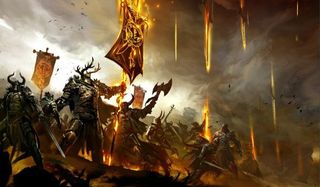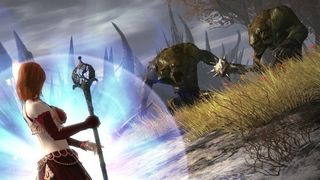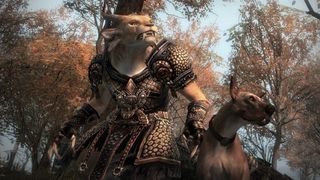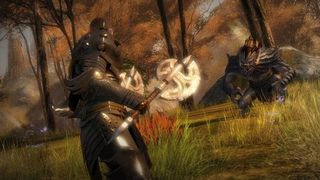Guild Wars 2 hands-on preview

Nothing is sacred. The developers at ArenaNet are tossing out ye olde MMO rules to make it easier than ever to team up with friends and succeed together, thanks to Guild Wars 2's groundbreaking world events and mind-blowing class design. Witness ArenaNet's coup on tradition and the hands-on action in this first of a five-part preview. The first two posts contain the info revealed in the PCG US December 2010 issue, and the following three are jam-packed with brand new, never-before-seen info and art! Stay tuned all week for all the Guild Wars 2 knowledge your brain can handle!

In 2005, Guild Wars busted into the MMO scene with a heretical proposition: that players could have a quality, triple-A online experience without paying a monthly subscription fee. But what seemed absurd then appears brilliant in retrospect--ArenaNet's bold, beautifully realized and susbcriptionless MMO attracted hardcores and curious outsiders alike and has sold over six and a half million copies to date. And five years later, Guild Wars 2 looks ready to shake up the genre once again. But this time around, instead of upending business models (GW2 will also be a boxed game with no subscription), ArenaNet wants to revolutionize the way players work and adventure together.
Haves and have-nots

The traditional model for grouping in MMOs relies on three roles for players to fill: healer, tank, and DPS (damage dealers). Players design their characters to fulfill one of these roles and rarely deviate from it while in a group. If you're the healer, for example, you wouldn't expect to stop healing until the dungeon is cleared. This model has been in place since the birth of grouping in MMOs, and very few games have seen success when they attempt to break away from it. Would ArenaNet dare desecrate this holy trinity—the most sacred relic of MMO-land? You bet your Charr they would.
Now, before defenders of the status quo begin screaming blasphemy and rioting in the streets, let me reassure you—ArenaNet isn't on a crusade to destroy the healer-tank-DPS tradition entirely. Instead, it intends to transform it into something even more accessible and enjoyable. As Lead Game Designer Eric Flannum explains it, “We don't want players to take on strict roles, but there are still roles that need to be fulfilled in combat… Every character is versatile, so it's up to you to recognize what other players are doing, what the situation is, and react to it.” The developers still want players to tank enemies, restore health to their friends and tear through enemy flesh like tissue paper as they always have in MMOs. The big change is that they want each player to do all of those things, as the situation warrants.
Think on your toes

It's all about flexibility. Groups will still want someone to run into the thick of things and take the brunt of enemy aggression, but why should that player be locked into that role at all times? Why can't a gun toting Charr pull out a mace and shield when he sees his friends in trouble and protect them? Why can't a magic-blasting Sylvari use her powers to heal her friends when that's what's needed most? In Guild Wars 2, they can.
But it's not all loosey-goosey--players still choose a definitive class when they create their character. The four announced classes so far are Warrior, Elementalist, Ranger and Necromancer--a healthy balance of the usual class archetypes (only Monk and Mesmer haven't been confirmed from the first game to return).
Choose your weapon

Unlike the original game—where players could cherry-pick skills from a massive pool of options—the skills that you have on your bar in GW2 are now determined by your class and the weapons you have equipped.
PC Gamer Newsletter
Sign up to get the best content of the week, and great gaming deals, as picked by the editors.
A warrior who equips a shield will see two tanking skills appear on his bar, for example, and if he equips a mace in his main hand, he'll be given three additional skills to stun and attack his opponents. Each player will have 10 skills on their bar: the first three determined by what's in their main hand, the next two determined by what's in their off hand (a two-handed weapon will determine all five), and the last five skills will be chosen by the player within categories—one self-healing skill, three utility skills, and one elite skill, which is very powerful but has a long cooldown.
Weapon restrictions will follow common sense logic—Elementalists won't be able to equip shields (although Flannum told me that he ran a five-man group filled with Elementalists that fared pretty well in dungeons, such as the two revealed in tomorrow's feature), and different classes will utilize the same type of weapon differently. For example, both the Warrior and the Ranger can equip a longbow, but the Warrior will use it for spray-and-pray AoE attacks while the Ranger will utilize it more elegantly as a long-range, single-target sniping weapon.
Out of combat, players can mix and match weapon sets to their heart's content, but before going into battle, they'll need to pick two sets of weapons that they'll be able to switch between freely during combat. The one exception is the Elementalist, who can't swap weapons during combat, but accomplishes the same thing by swapping between his or her four attunements (fire, earth, water, and air).
Controlled chaos

Flannum describes his vision for the game's combat as “controlled chaos fun,” adding that “in MMOs, combat gets really fun when things go wrong. When the tank goes down and you have to yell at the off-tank to grab the boss's attention—that's when things get exciting. Our combat makes that the constant state of things, so you're always in an exciting situation… but we try to over-communicate visually what's happening around you, so you always know what's going on and it's not just mass chaos.” It sounds good to us, but can they pull it off effectively?
Most Popular

